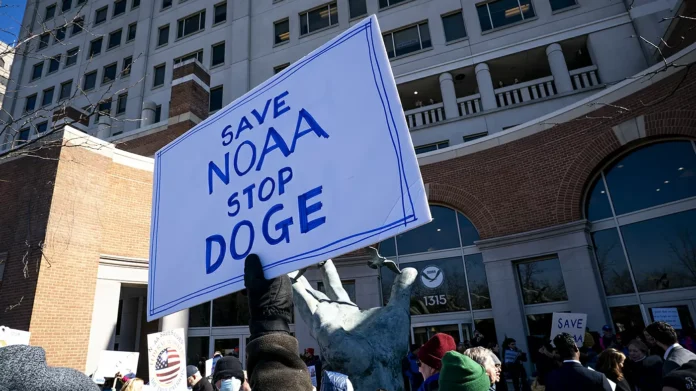The Trump administration has recently released a budget document that has caused quite a stir in the scientific community. According to this document, the administration wants to completely eliminate funding for climate research at the National Oceanic and Atmospheric Administration (NOAA). This decision has raised concerns among experts and environmentalists, who fear the potential consequences of such a move.
The budget document states that there will be no funding allocated for the agency’s climate laboratories or regional climate data and information. Additionally, the administration wants to eliminate all research at NOAA’s weather research program and other related programs. This decision has been met with widespread criticism, as climate research is crucial for understanding and addressing the current climate crisis.
The National Oceanic and Atmospheric Administration is a federal agency responsible for monitoring and predicting changes in the Earth’s environment. It plays a vital role in providing accurate and reliable information about our planet’s climate and weather patterns. The agency’s climate laboratories and regional data centers are essential for collecting and analyzing data from various sources, including satellites, buoys, and weather stations. This data is then used to understand the Earth’s climate and make informed decisions about mitigating the effects of climate change.
The proposed budget cuts would not only affect the agency’s ability to conduct climate research but also hinder its ability to provide accurate weather forecasts. The weather research program at NOAA is responsible for developing and improving weather prediction models, which are crucial for protecting lives and property from severe weather events. Eliminating this program would not only put people’s safety at risk but also have a significant impact on industries such as agriculture, transportation, and energy, which rely heavily on weather forecasts.
Furthermore, the budget document also proposes to cut funding for NOAA’s satellite programs, which provide critical data for weather forecasting and climate research. Satellites are essential for monitoring changes in the Earth’s atmosphere, oceans, and land, and any cuts to these programs would severely impact our understanding of the planet’s climate.
The decision to zero out climate research funding at NOAA is not only short-sighted but also goes against the agency’s mission to understand and protect our planet’s environment. Climate change is a global issue that requires urgent attention and action. The United States, as one of the world’s leading economies, has a responsibility to lead the way in addressing this crisis. Cutting funding for climate research at NOAA sends the wrong message to the rest of the world and undermines the country’s commitment to tackling climate change.
Moreover, the proposed budget cuts would also have a significant impact on the scientific community. Many scientists and researchers rely on NOAA’s data and resources for their work, and any cuts to the agency’s funding would hinder their progress. It would also discourage young scientists from pursuing a career in climate research, which is crucial for finding solutions to the climate crisis.
In recent years, we have seen the devastating effects of extreme weather events such as hurricanes, wildfires, and floods. These events have been linked to climate change, and it is essential to continue studying and understanding the Earth’s climate to mitigate their impact. Cutting funding for climate research at NOAA would be a step in the wrong direction and could have severe consequences for our planet and future generations.
In conclusion, the Trump administration’s proposal to zero out climate research funding at NOAA is a cause for concern. It not only jeopardizes the agency’s ability to provide accurate weather forecasts but also hinders our understanding of the Earth’s climate. Climate change is a global issue that requires immediate action, and cutting funding for climate research goes against this goal. It is crucial for the administration to reconsider this decision and prioritize the protection of our planet for the sake of current and future generations.

